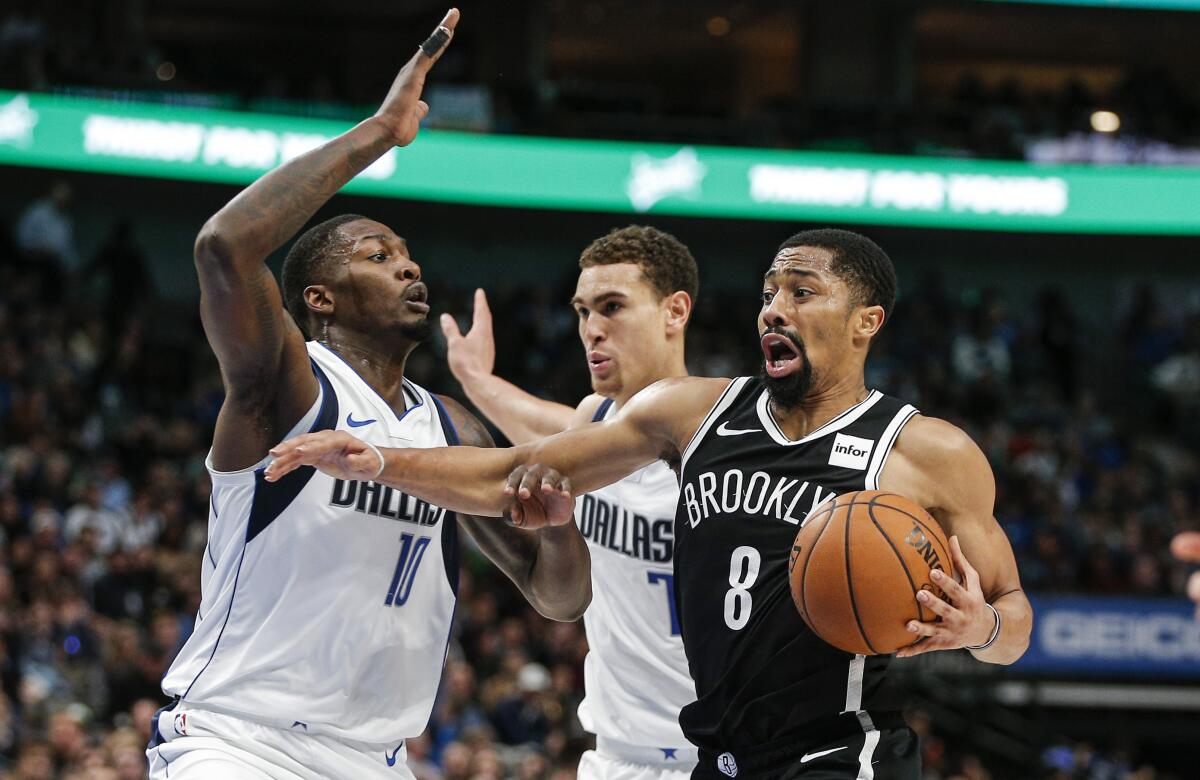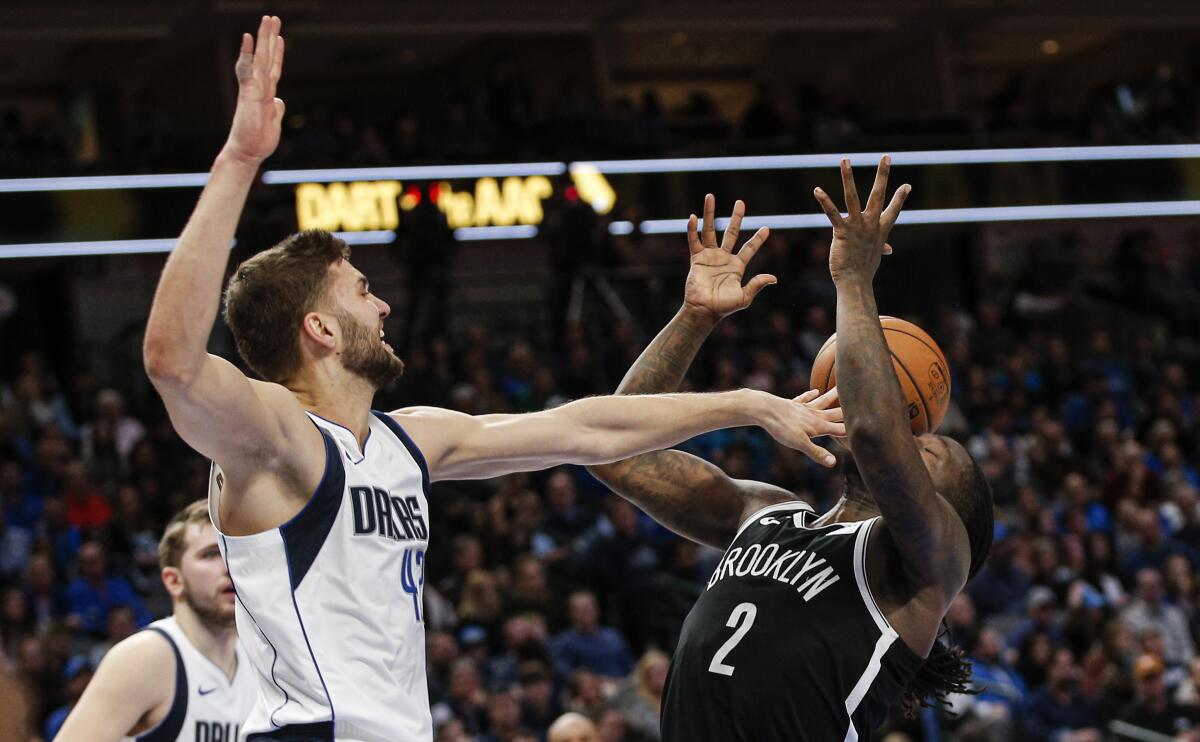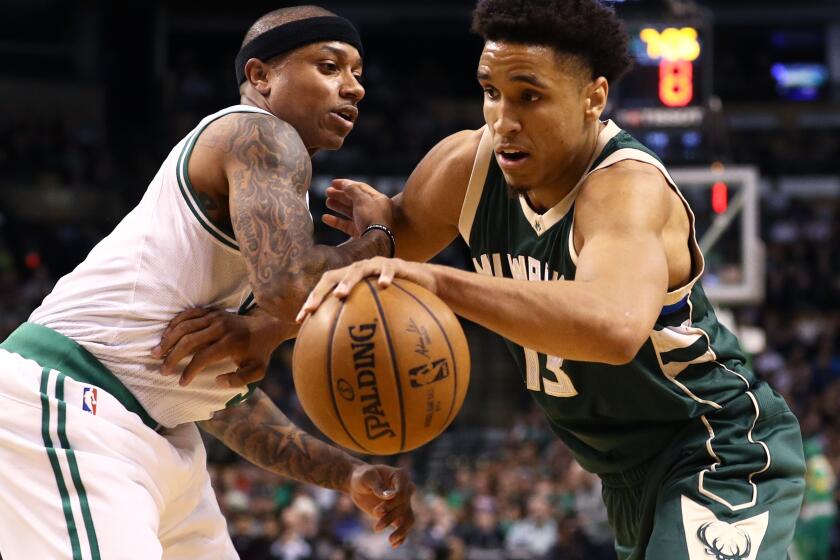How the Mavericks built a contender around Luka Doncic

- Share via
Dallas Mavericks coach Rick Carlisle scrunched his face in discomfort when he heard the start of the question.
His team is succeeding because of Luka Doncic’s one-year acceleration from rookie sensation to most-valuable-player candidate, but there are other reasons to Dallas’ success.
As the question continued, though, Carlisle’s contorted face became normal.
Doncic is a big part of why the Mavericks are the surprise team in the West — maybe in the entire NBA. They’re 22-12 and have the best offense in the NBA. Helping make them a contender are a handful of players the Mavericks discovered and developed.
“We’re very much strength in numbers, sum of our parts are greater as a unit than our individuals,” Carlisle said earlier this week. “Everybody plays a role.”
To assemble a contender, the Mavericks prioritized finding players capable of filling roles, using the twilight years of Dirk Nowitzki’s historic career to develop undrafted and undervalued players such as Dorian Finney-Smith, Maxi Kleber and Dwight Powell. Once they lucked into acquiring Doncic on draft day, they had a ready-made group of contributors around him.
The three players are in the top six in minutes for the Mavericks, with Finney-Smith probably the biggest success story. They all had, as Dallas front-office people agree, acceptable imperfections that allowed them to slip through the cracks and into their rotation.
For a team like Dallas, it’s been the best-case scenario with three consecutive losing seasons serving as the feeder for the current roster.
“That was the most important thing, live reps at the NBA level,” said Powell, a 6-foot-10 center from Toronto who prepped at IMG Academy and played at Stanford. “There’s nothing that compares to that in development. To figure out the speed, to figure out the ways you can be successful in this league, you have to spend the time playing. You have to get used to the pace, you have to get used to the reads. And you have to get comfortable with making mistakes.”

Sign up for Full-Court Text with NBA reporter Dan Woike
Receive SMS texts about the Lakers, Clippers and the rest of the NBA and text back with your questions.
There was time for all of them to experience that.
Undrafted out of Florida, the Mavericks targeted Finney-Smith immediately after the 2016 NBA draft. Injuries and a strong summer opened a spot on the roster for the defensive-minded, fourth-year forward. Paired with Carlisle’s willingness to play everyone, Finney-Smith played in a team-high 81 games as a rookie.
“It was good timing, the right situation when I got here. Guys were banged up,” Finney-Smith said. “I just got an opportunity to show what I can do and I’ve been playing ever since. I’m happy that it was here. You never know. Things could’ve been different. But coach trusted me.”
His imperfections were on full display for three seasons in the NBA, as Dallas tried to cast Finney-Smith into a “3-and-D” forward while he was one of the league’s worst shooters. But the organization’s and Finney-Smith’s stick-to-it attitude paid off this season, with him now making 38.9% from deep — a massive jump from the 30.3% he previously averaged.
“The reason I’m on the court, obviously, is my defense,” Finney-Smith said. “The coaching staff, the players, they all see the work I put in. We have guys that have confidence in me shooting. Even last year when I wasn’t making as much, coach Carlisle would yell at me when I wasn’t taking shots. You can see the work. I can shoot it. It was just a matter of time. “
Kleber was another scouting success story.
Indiana Pacers guard Malcolm Brogdon began his career with the Milwaukee Bucks, who he helped defeat the Celtics with a clutch performance in Boston.
Ignored by NBA teams in the 2014 NBA draft, the German national team member played in Spain and his home country before the Mavericks offered him an opportunity in 2017. While Kleber had interest from other NBA teams, the Mavericks’ track record with European players and their commitment to development got the 6-10 big man on board.
He’s become the Mavericks’ first big man off the bench, a versatile offensive threat who can roll to the basket or stretch defenses to the three-point line while making an impact on the defensive end.
“When you know what you have to do in your role, it’s pretty easy to fulfill it,” Kleber said. “For me, it was the perfect situation. It sucks to lose, but for me it was a good thing. It was probably the only chance to jump in there and play and have a chance to show what I can do. From there on, I got to more playing time, I could develop my game in the NBA more, understand the game more and work on all that.”
The Mavericks didn’t draft Powell — that was Charlotte, which dealt him to Cleveland on draft night. He was traded again before his rookie season, this time to Boston, where he spent two months traveling between the Celtics and their G League affiliate in Maine.
Dallas acquired him in a trade for Rajon Rondo, with Powell being an afterthought. Ironically, the first-round pick the Mavericks sent to Boston in the deal eventually helped clear minutes for the likes of Powell, Finney-Smith and Kleber.

Now in his sixth season with the Mavericks, Powell’s grown into the team’s starting center, the physical presence necessary next to 7-3 power forward Kristaps Porzingis in the Dallas frontcourt.
“We put an emphasis on development. It’s a cornerstone of what we do, and that’s intentional,” Powell said. “We’ve got guys who we think can improve, guys who we think can work in our system and do whatever we can to be successful by finding ways to emphasize their strengths regardless of public perception.”
Getting Doncic was the coup — he’s the key to Dallas’ future — but he’s not the biggest front-office victory.
“Anyone could’ve walked into the gym in Barcelona and seen what we did,” Mavericks general manager Donnie Nelson said of scouting a teenager already playing at the pro level.
The real win was the organization’s eye toward the future during the lean years, a stated goal to develop role players while they waited for the next Nowitzki-level star to emerge.
Now that they have their star, Dallas didn’t have to waste time looking for people willing to play within their roles.
“You’ve got to know what you do well,” Finney-Smith said. “And we know who we are.”
More to Read
Go beyond the scoreboard
Get the latest on L.A.'s teams in the daily Sports Report newsletter.
You may occasionally receive promotional content from the Los Angeles Times.












